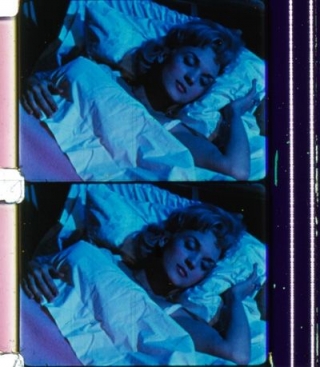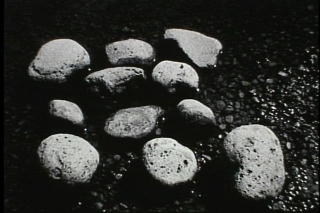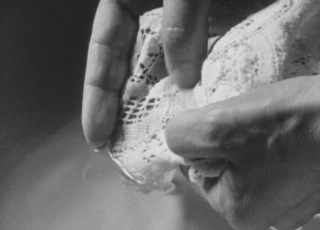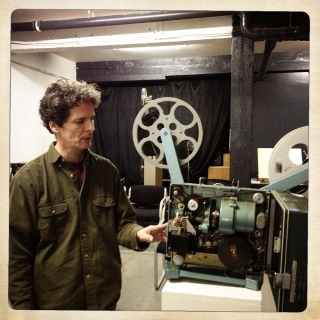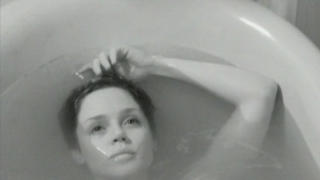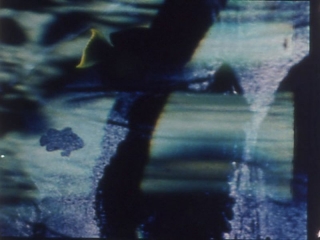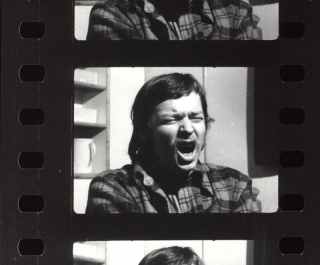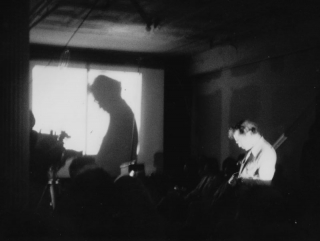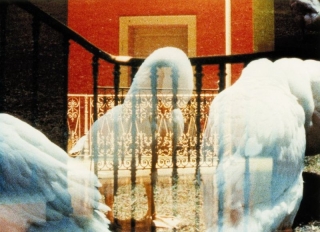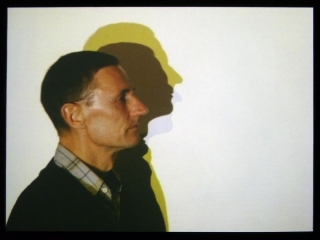Date: 11 September 2002 | Season: LUX Salon
LUX SALON: NEW GERMAN CINEMA with Thomas Draschan
Wednesday 11 September 2002, at 7:30pm
London LUX
German Filmmaker Thomas Draschan presents a special programme of new experimental cinema from Germany including work by Draschan, Ulrich Wiesner, Thomas Feldmann, Kerstin Cmelka, Goh Harada and Nino Pezzella.
Thomas Draschan was a student of Peter Kubelka at the Stadelschule in Frankfurt and co-curated the programme ‘In Kubelka’s Shadow’ at the 2001 London Film Festival, which included earlier works by several of the filmmakers that are featured tonight. He works independently to organise the Frankfurt Filmschau, and the Independent Film Show in Naples.
Thomas Draschan, Yes Oui Ja, 2003, 16mm, colour, sound, 4 min
Ulrich Wiesner, Afrika Bonus, 1982, 16mm, colour, sound, 3 min
Ulrich Wiesner, Deutschland Lacht (Germany Laughs), 1982, 16mm, colour, sound, 3 min
Thomas Feldmann, 2 Chinesische Zeichen (2 Chinese Signs), 1982, 16mm, colour, sound, 2 x 2 min
Goh Harada, Blaufilm, 1999-2000, 16mm, colour, silent, 10 min
Nino Pezzella, Zum Briefkasten, 1989-2002, 16mm, colour, sound, 17 min
Date: 18 November 2002 | Season: LUX Salon
LUX SALON: PHILIP HOFFMAN
Monday 18 November 2002, at 7pm
London Canada House
Philip Hoffman has long been recognized as Canada’s preeminent diary filmmaker. For over twenty years he has been straining history through personal fictions, using the material of his life to deconstruct the Griersonian legacy of documentary practice. As an artist working directly upon the material of film, Hoffman is keenly attuned to the shape of seeing, foregrounding the image and its creation as well as the manufacture of point-of-view. Hoffman’s films are deeply troubled in their remembrances; he dusts off the family archive to examine how estrangement fuels a fascination with the familiar surroundings of home.
Mortality forms the absent centre of Philip Hoffman’s oeuvre, a body of films that seems to foreshadow a penultimate loss that will take the maker to the outer and inner reaches of grief. Through the repeating figure of death – whether a boy lying on a Mexican roadside, the death of an elephant at the Rotterdam Zoo, or his uncle’s legacy of insanity and death in passing through/torn formations – Hoffman approaches the limits of representation and the ethical burdens of vision and reproduction. (Karyn Sandlos, Toronto Images Festival, 2001)
Please Note: Opening Series 2 consists of 12 segments, each segment in its own hand- painted film canister. Through the visual references on the canisters, the audience, prior to the screening, orders the flow of the film.
Philip Hoffman, Kokoro is for Heart, 1999, colour, sound, 7 min
Philip Hoffman, passing through / torn formations, 1998, b/w & colour, sound, 43 min
Philip Hoffman, Chimera, 1996, colour, sound, 15 min
Philip Hoffman, Opening Series 2, 1993, colour, silent, 7 min
Date: 19 November 2002 | Season: LUX Salon
LUX SALON: GUNVOR NELSON
Tuesday 19 November 2002, at 7:30pm
London LUX
Swedish avant-garde filmmaker, Gunvor Nelson was one of the central figures in the avant-garde film movement that emerged in the Bay Area in the 60s. Tonight she presents a selection of her work including the classic Red Shift as well as her recent videotapes.
Gunvor Nelson, Red Shift, USA/Sweden, 1984, 16mm, b/w, sound, 50 min
Gunvor Nelson, Tree-Line (Tradgrans), Sweden, 1998, video, colour, sound, 8 min
Gunvor Nelson, Snowdrift (aka Snowstorm), 2001, video, colour, sound, 9 min
Red Shift is a film in black and white about relationships, generations and time. The subtitle is ‘All Expectation’. The movement of a luminous body toward and away from us can be found in its spectral lines. A shift toward red occurs with anybody that is self-luminous and receding. There is uncertainty about how much observable material exists.
“It involves Gunvor Nelson, her mother and her daughter. Carefully and with great tenderness, it focuses on these three women, trying to show us their relationship, succeeding with an emotional impact that is hardly ever found in such a subject. It is not the social context which is exploited but the little gestures, everyday events. Red Shift is a radical film; it sets new measures for avant-garde filmmaking dealing with personal problems.” (Alf Bold, Arsenal, Berlin)
Date: 15 January 2003 | Season: LUX Salon
LUX SALON: ALEX MACKENZIE
Wednesday 15 January 2003, at 7:30pm
London LUX
Alex MacKenzie works as a media curator, filmmaker and performer in the film and video fields. His works are simultaneously accessible and abstract, working from a model of both expanded cinema and performance with the serendipity of the hand-processed and degraded image integral to the work. Alex is the primary programmer and coordinator of The Blinding Light!! Cinema, an alternative and underground screening and performance space devoted to presenting cutting edge, underground, and obscure film and video six nights a week in Vancouver, Canada. He is also the Festival Director for the Vancouver Underground Film Festival. This is his first European tour.
“I am currently interested in reconfiguring, repositioning and recontextualizing outmoded and ephemeral film materials and media devices in order to examine them beyond their original intention and as a formal attempt to dehistorify and reinvent meaning.” —Alex MacKenzie
Alex MacKenzie, This Fleeting, 2003, video (originally 16mm), 45 min
Alex MacKenzie, MEDI(CINE), 2003, expanded cinema performance, 16mm, 20 min
PROGRAMME NOTES
LUX SALON: ALEX MACKENZIE
Wednesday 15 January 2003, at 7:30pm
London LUX
THIS FLEETING
Alex MacKenzie, 2003, video (originally 16mm), 45 min
In 1996 I was handed a boxfull of ten-minute reels containing 16mm home movies. Shot on gorgeous Kodachrome and in Black and White the films are an incredible document of a time in history – 1948 to 1957 Vancouver and around the world – a stunning record of people, places and activities. I was inspired to reinvent and retool meaning from these films. Until now this retooling for me has meant a conscious highlighting of intended moments of spectacle, beauty and awe. With This Fleeting, I explore precisely the opposite. What of moments that are unintentional, unplanned, and finally, undesired? This Fleeting is, then, a reconfiguring of the minute and fragile moments of unintended beauty captured by a stranger in the middle of the twentieth century. Exploring the structural and visual fields with equal interest, a language of movement and invisible history is magnified, slowed down and meticulously uncovered. “This Fleeting is a re-take on the empire of family, going back through a single family’s archive and relooking at the moments, the gestures of inclusion and exclusion, the way they’ve managed to say yes with the camera. These home movies were originally made between 1948-1957 and feature bathing beauties, parades, cars, trips abroad and much much more. Relive the dream.” —Mike Hoolboom
MEDI(CINE)
Alex MacKenzie, 2003, expanded cinema performance, 16mm, 20 min
Through a subtle and mesmerising recombination of rare 16mm American medical films (originally intended for doctors’ eyes only), MEDI(CINE) jars us with unexpected clashes of images and subtle gestures of reinterpreted visual and audio information, rendering illness as beauty – the decomposing and recomposing body as site of transformation. Using colour gels, hand-masking and image-layering in a two-screen live presentation, MEDI(CINE) blends original sounds with re-tooled audio in an expanded cinema performance of physical catastrophe. ‘The sheer virtuosity of MacKenzie’s live film performance is enough to blur the line between cinema and historical re-enactment. This is history – that which is made only when reproduced – the vital urge to comprehend what has not been lived, to find meaning in the abandoned fragments of mere grandeur.’ —Jeremy Rigsby, Artistic Director, Mediacity
Back to top
Date: 12 February 2003 | Season: LUX Salon
LUX SALON: AZAZEL JACOBS
Wednesday 12 February 2003, at 7:30pm
London LUX
First-time feature film maker Azazel Jacobs skillfully interweaves four strands of New York life. The city itself is a central character, portrayed in delicate black and white imagery. A young black man who observes and acts as our eyes through his voice-over represents another. The third, forming the central story, involves a young actress, disenchanted by an audition, now struggling to find another way to be herself, in contrast to her flat mate still dreaming of being a star. And fourth are the auditions of a pretentious young director, actually completely unclear about what he seeks, who takes his actresses through the ordeal of convincingly playing their death. While he works with some dangerously familiar motifs of the American indie cinema (agonising young actresses, the making of films about the making of movies), Jacobs gives fresh depth to this territory, always offering a completely convincing and sympathetic portrait of his young New Yorkers and their scene, always keeping us involved. He gets the best out of his actors, the auditions in particular make fascinating performance pieces within the film itself. A film with brains. Premiered at Rotterdam Film Festival 2003, and selected for screening in the Hong Kong Film Festival.
Azazel Jacobs, Nobody Needs to Know, USA, 2003, 95 min
A fresh and absorbing portrait of New York, its streets and views is folded intelligently in with a story of a young New York actress struggling to escape the shallowness of the acting world, heightened by a subtle sub-theme of almost Warholian filmed auditions.
Date: 26 June 2003 | Season: LUX Salon
LUX SALON: COURTNEY HOSKINS & MARY BETH REED
Thursday 26 June 2003, at 7:30pm
London LUX
LUX is pleased to present the first UK show by Courtney Hoskins and Mary Beth Reed, two young American filmmakers whose films combine photographed footage with hand-painted film and manipulation of the optical printer. Both studied with Stan Brakhage and Phil Solomon at the University of Colorado in Boulder, and their works were included in the recent Brakhage fundraiser and tribute at The Other Cinema. Courtney Hoskins uses various optics techniques to create her film worlds. Using the properties of the light waves themselves (twisting and bending certain wavelengths), she develops an otherworldly palette that shows the complexities and surprises found in the seemingly mundane objects of our daily lives. Mary Beth Reed mixes animation and abstraction into a kaleidoscopic flow of hand painted and optically printed film. She creates films of exquisite colour and imagery that dance across the screen with a mesmerising and unique rhythmic quality. The programme will be in two discreet parts, with a short interval, and both Courtney and Mary Beth will be here to discuss their work.
Courtney Hoskins, The Galilean Satellites (Europa, Io, Ganymede, Callisto), 2003
Courtney Hoskins, Munkphilm, 2001
Courtney Hoskins, Gossamer Conglomerate, 2001
Courtney Hoskins, Snow Flukes, 2002
Courtney Hoskins, Les Vitraux de St. Chappelle, 2003
Mary Beth Reed, Sunday Afternoon
Mary Beth Reed, Sand Castle, 2000
Mary Beth Reed, Pink Film, 2000
Mary Beth Reed, Montessori Sword Fight, 2002
Mary Beth Reed, Floating Under a Honey Tree, 1999
Mary Beth Reed, Moose Mountain, 2002
Mary Beth Reed, Moose Mountain 2
Date: 8 October 2003 | Season: LUX Salon
LUX SALON: WOJCIECH BRUSZEWSKI: FILM / VIDEO / PHENOMENA
Wednesday 8 October 2003, at 7:30pm
London LUX
As a founder member of the Lodz Film Academy’s radical Workshop of Film Form in the early 70s, Wojciech Bruszewski’s multimedia experiments included YYAA, a 3-minute long primal scream in which changes in light exposure modulate the soundtrack. Other films, like Tea-Spoon and Match-Box, also challenged the viewer by manipulating expectations of synchronous sound and image, and his early video work examines the immediate relationship between camera, monitor and viewer made possible by instant playback or live feed technology. At the LUX Salon, Bruszewski will offer a selection of works by himself and his students, from his earliest days to the present. The final programme contents to be decided by the audience on the night.
Presented in association with Lumen and Evolution 03, Leeds.
Date: 13 October 2003 | Season: LUX Salon
LUX SALON: TAKA IIMURA: 2 FILM PERFORMANCES
Monday 13 October 2003, at 7:30pm
London LUX
Legendary Japanese avant-garde film and video artist Takahiko Iimura has rigorously explored structural, material and theoretical properties of film, video and new media for over 40 years. At the Lux Salon he will appear in person to present two of his vintage live film performance of the 1970s: Circle and Square (for 16mm film loop and hole punch) and White Calligraphy (for mobile Super-8 projector).
Presented in association with Lumen and Evolution 03, Leeds.
Date: 12 November 2003 | Season: LUX Salon
LUX SALON: HANNES SCHÜPBACH: FILM SOLO
Wednesday 12 November 2003, at 7:30pm
London LUX
The Swiss artist Hannes Schüpbach creates silent colour films that evoke an experience similar to poetry. He composes and varies images of places, people, and gestures, deriving from a specific living context in each film. The subtlety and distance of his images invite the eye to ‘listen’ very carefully. The program shows the gradual development of the artist’s film language, based on the nature of the film image as both trace of reality and potential metaphor. Hannes Schüpbach has been working with film, parallel to his large painting suites, since the early 1990s.
Hannes Schüpbach, Portrait Mariage, 2000, colour, silent, 9 min
Hannes Schüpbach, Spin, 2001, colour, silent, 12 min
Hannes Schüpbach, Toccata, 2002, colour, silent, 28 min
PROGRAMME NOTES
LUX SALON: HANNES SCHÜPBACH: FILM SOLO
Wednesday 12 November 2003, at 7:30pm
London LUX
PORTRAIT MARIAGE (filmed in the Val Bregaglia, Switzerland)
Hannes Schüpbach, Switzerland, 2000, colour, silent 9 min
Portrait Mariage turns the staging of a rite of passage into an allusively layered narrative. The film distils a sensual remembrance by the filmmaker’s intense participation and his spontaneous aesthetic choices.
SPIN (filmed in Winterthur, Switzerland)
Hannes Schüpbach, Switzerland, 2001, colour, silent, 12 min
Spin reflects the beauty of the transitory and evokes the regret connect to its passing. The artist’s ageing mother, at the centre of this film, marks the unique presence of the single human consciousness. (Spin – the inherent turning momentum of electrons.)
TOCCATA (filmed in Genoa, Italy, 1999-2001)
Hannes Schüpbach, Switzerland, 2002, colour, silent, 28 min
Toccata develops the ‘touch of the place’ through a direct encounter with the seemingly familiar elements of a house and city. The image recreates an inner experience by the use of a wide range of stylised movements and colourings. “Il tocco means not only touch; it can also mean a small quantity, a single brush stroke in painting, the striking of a bell or piano keys.” Toccata was screened at the 2002 New York Film Festival’s ‘Views from the Avant-Garde’.
Back to top
Date: 14 November 2003 | Season: LUX Salon
LUX SALON: WERNER VON MUTZENBECHER: EVERYDAY ACTIONS / ORDINARY OBJECTS
Friday 14 November 2003, at 7:30pm
London LUX
The first ever UK solo screening for this established Swiss artist, who will present a selection of his films from 1971 to present. Mutzenbecher began painting in 1958 and filmmaking in 1968, and has exhibited regularly in Switzerland and Europe. Apparently mundane actions and objects are the focus of his films, which blur the boundaries between materiality, portraiture and performance. The early works are more performative, while later films take a diaristic, personal approach to create impressions of Mutzenbecher’s immediate environment, using those characteristics unique to the medium.
Werner Von Mutzenbecher, III/71, 1971, b/w, sound, 15 min
Werner Von Mutzenbecher, XIV/82 Filme, 1982, colour, sound, 21 min
Werner Von Mutzenbecher, XV/84 Vogelhaus, 1984, b/w, sound, 9 min
Werner Von Mutzenbecher, XVI/84 Fenster III, 1984, b/w, silent, 4 min
Werner Von Mutzenbecher, XVIII/85 Untergrund, 1985, b/w, sound, 5 min
Werner Von Mutzenbecher, XIX/88 4 mal 8, 1988, colour, silent, 3 min
Werner Von Mutzenbecher, XXIV/99 Fenster IV, 1999, colour, sound, 3 min
Werner Von Mutzenbecher, XXVI/99/03 Rencontres, 1999/2003, b/w, silent, 2 min
Werner Von Mutzenbecher, XXVII/03 Filmmakers’ Afternoon, 2003, b/w, silent, 6 min
PROGRAMME NOTES
LUX SALON: WERNER VON MUTZENBECHER: EVERYDAY ACTIONS / ORDINARY OBJECTS
Friday 14 November 2003, at 7:30pm
London LUX
FILMMAKERS CREDO (Werner Von Mutzenbecher, 2003)
film is a motion-picture
film is emotion
film is approachable to everybody
film is a language with laws to respect
experimental film can be compared to music, to poetry
film-pictures reach the consciousness and the subconscious
film is psychology
film is the most complex medium: time, movement and space are connected
film is memory
film is a document of time, places and persons
film is rhythm, is speed, but can also be slow and quiet
film is animation
film occupies the eyes, feeds the fantasy
film can be more real than reality
film is between reality and dream
film can manipulate the truth, film can be dangerous
film can be realised almost alone like a painting
imagination and innovation can be forced by a low budget
film-pictures can transport ideas and sentiments without words
silence can be like a sound
sound can influence the character of the images, can change the atmosphere
self-made film-pictures can be perceived as found footage
filmmaker, camera and projection make a fruitful triangle together
film open doors
film let feel the relativity of positions
film produces film
film constructs a new reality
film-projection is a moving painting of lights and shadows
film is an illusion
film is fugitive like life-time
film is a travel in space and time
film is a constant metamorphosis of images taken from reality
film explore the secrets of visible an invisible things
film is a mystery
About ten years after the beginning of my painting career I realised my first film and I also began to write. Since these days, I continue painting, filmmaking and writing with more or less intensity. To be able to speak different languages opened to me a larger spectrum of expression. I like the complexity and the possibilities inside the film and I am still curious to see what I can do by myself with a camera.
Back to top
